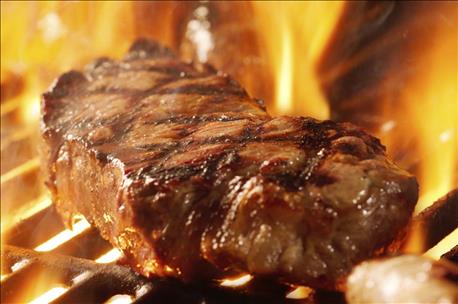
Here I go again. The economy has been in the toilet since 2008, but it's sliding backward again: Even within a depression, there are ups and downs.
Lest I need remind you, this is a real problem for beef producers and the beef markets. Beef is a premium protein. As the U.S. and global economies -- as if there is much separation anymore between developed nations -- have begun to unravel in recent months, beef pricing and other numbers support my statement.
Economist Bill Helming recently warned: "Based on the S&P Global Luxury Index, global luxury brands are tanking. U.S. high income and the more affluent Americans’ spending is now starting to decline and is going south."

Out of the fire: Can beef survive the hard times as an untouchable when other premium products and brands are falling away? History says it's unlikely.
Helming noted that upscale brands such as Nordstrom, Ralph Lauren, Sotheby’s, Tiffany and Company, Williams-Sonoma and Louis Vuitton now are down by 24-48% since the latter months of 2015.
Helming added, "The above-mentioned 20% of Americans who have the highest U.S. incomes account for 50% of all spending and are also those Americans who own the majority of U.S. real estate, stocks and corporate bonds. These people are typically the high-income Americans and these are the same people who will lose by far the most money and wealth over the next three to five years as the U.S. stock, real estate and corporate bond markets collapse."
The problem with that, domestically, is these are the folks who have done well in the funny-money economy created by the Federal Reserve Board's massive money-printing scheme, and they are the ones who have propped up the pricey end of the beef complex -- namely the high-cost middle meats.
The hamburger complex has been under a lot of pressure all along, as the other 50% of spenders in the U.S. economy -- the middle class -- struggle under the weight of large real unemployment and underemployment not recognized by the government employment accounting system. Consumers at the meat counter are comparing: Chicken at 89 cents a pound or ground beef at $3.55. Tough choice ...
Helming says these downtrends will be "particularly bearish" on all luxury items in the next several years, including consumer beef consumption, and therefore on prices in the entire beef complex.
And don't forget all the great news in recent years about beef exports, particularly of steaks to the Pacific rim countries. Do you think that's going to hold up in the face of worldwide recession?
Economist David Stockman has some revealing numbers on that in a recent column. South Korea, the bastion of Pacific rim capitalism, is in an economic landslide. Stockman says the same pattern marks the entire East-Asia export belt, and China's centrally planned "capitalist" expansion is rapidly reaching the bubble-burst stage. Chinese exports are plummeting as economies of its only real customers, the European Union and the U.S., reach stall speed.
So, here we are. Literally years of "financial stimulus" by the U.S. central bank has actually stimulated nothing but equity markets, including the stock and commodities markets.
Stockman says, "All of today’s massive central bank intrusion is ending up in the secondary markets where it is causing the falsification of financial asset prices and massive, unearned and ultimately destructive windfall gains to speculators."
"In fact," he says, "tepid growth of labor hours, productivity and output is a supply-side problem. In that respect, replacing the current burdensome 16% payroll tax on America’s high cost labor with a consumption tax on the nation’s heavily imported goods would do more for supply side growth than central bankers could ever accomplish in a month of Sundays."
Think about that for a few hours and days, all you TPP supporters.
And in case you doubt what I'm telling you, I'll repeat my mantra that you're being lied to by the people who work very hard to control the flow and type of information being disseminated and benefit from those lies.
Alternately, you must get your facts from a variety of sources who at least appear to value truth over immediate gain or behavior-dependent salary. These are your choices: Slurp down the cherry syrup from the bubbleheads on the flat screen, or search out your own information, most of which must be found on the internet and must be vetted with a wry and distrustful mind.
To wit: Getting your knowledge from television, discovering you're being lied to, and then continuing to watch television "news" as your primary information source is akin to drinking small amounts of arsenic, then realizing you should detoxify and beginning chelation therapy, but continuing to drink the arsenic.
I'm not going to chase this rabbit terribly far, but all the network and cable news is now owned by six -- count 'em -- six major corporations. It doesn't take too much detective work to figure out who the major stockholders are and what is their agenda.
I'll end where I started, that it's my opinion our industry has a long row to hoe, with weeds aplenty and a dull eye-hoe in hand.
Calves have already dropped to about 60% of the prices they brought at their peak just months ago.
Get your financial house in order, and line up your operation for low-cost, high-production output. Then look for opportunities where they appear in the hard times ahead.
About the Author(s)
You May Also Like




